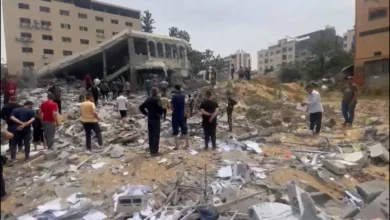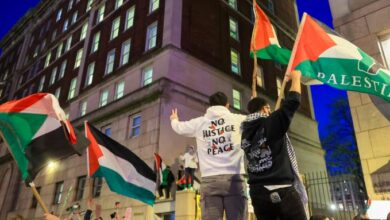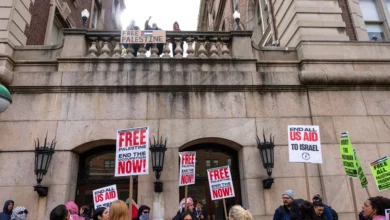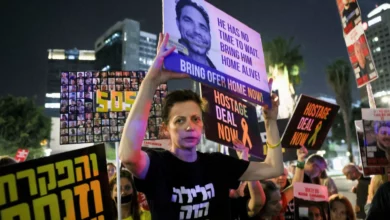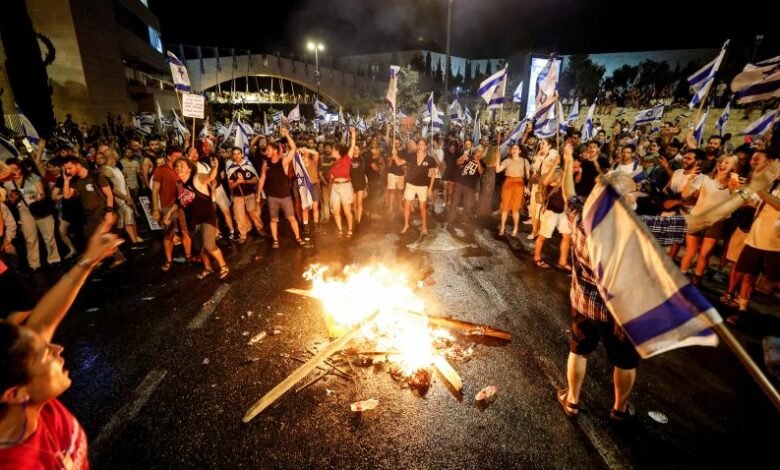
The law that came into effect on Wednesday took away the court’s power to veto government decisions based on them being “unreasonable.” Millions opposed the change, according to opinion polls, which critics said would erode the independence of the courts and harm Israel’s democracy.
“At the current point in time, the IDF (Israel Defense Forces) is competent,” IDF Chief Spokesperson Rear Adm. Daniel Hagari told reporters on Tuesday, but he acknowledged that the country’s military readiness could be affected.
“If reservists do not show up for a long time, there will be damage to the army’s competence. It is a gradual process that will be affected according to the presence of the reservists,” he said.
The threat is unprecedented in its scope, experts say, and the military has pleaded with reservists to remain in their posts.
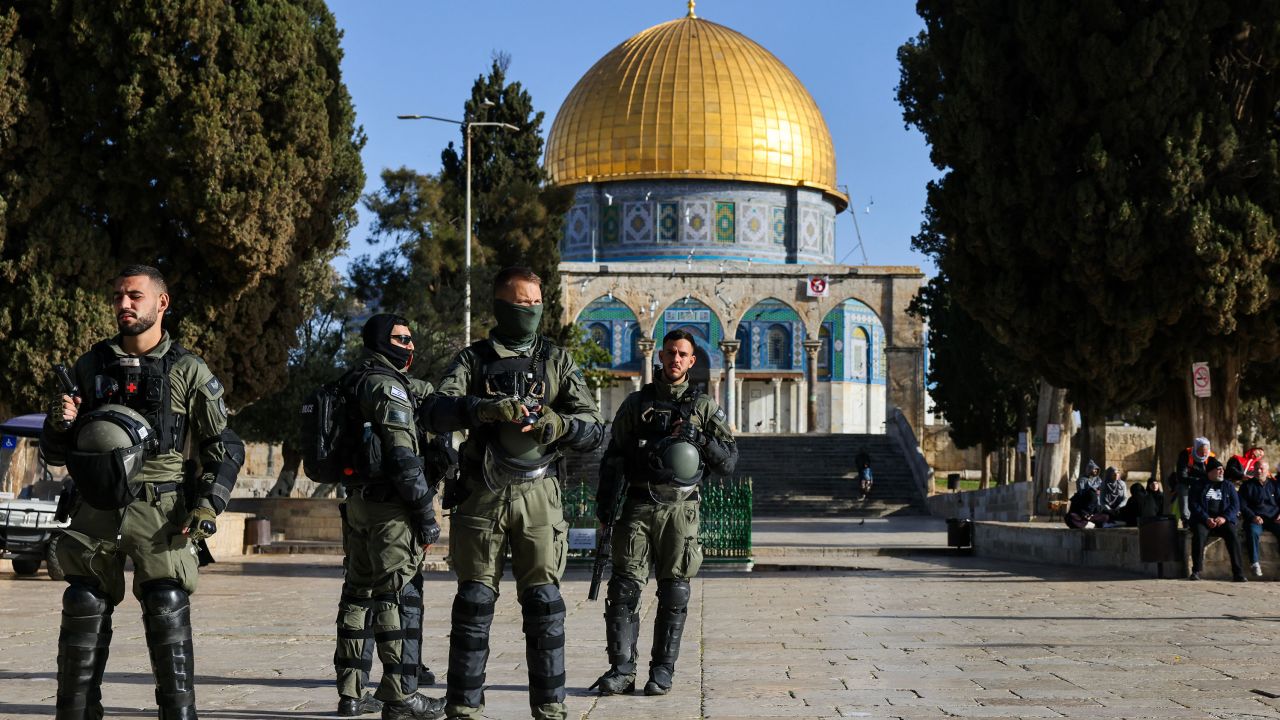
“The IDF needs you – only together will we protect our common home,” IDF Chief of General Staff Herzi Halevi said Tuesday, addressing reservists who refused to show up for service.
Nearly 10,000 military reservists said before the passage of the controversial “reasonableness” bill on Monday that they would refuse to volunteer for duty if it was passed. And the number of refusers is growing, according to Hagari.
US Secretary of Defense Lloyd Austin spoke by phone with Israeli Minister of Defense Yoav Gallant and reiterated the US’ commitment to Israel’s security. But he also said that “broad consensus through political dialogue” was critical to maintain democracy.
Chuck Freilich, a senior researcher at The Institute for National Security Studies (INSS) in Tel Aviv who served for over 20 years in Israel’s national security establishment, said that Israel is at a historical “inflection point,” in which “extreme measures may have to be taken to endure Israel’s fundamental character of democracy.”
Speaking about reservists refusing, Freilich said that “on the one hand, it is admirable.” But on the other hand, he said, “it is a horrible thing for the IDF.” It was remarkable, he added, that one of the world’s better militaries “is threatening to come apart at the seams over domestic changes.”
When the vote passed on Monday, Israeli Prime Minister Benjamin Netanyahu called on the IDF to “stay out of any political controversy,” saying that “the call for refusal harms the security of all citizens of the country.”
The ‘backbone’ of Israel’s military
A country that went to war shortly after its founding in 1948, Israel has fought seven wars and engaged in several other smaller conflicts with its neighbors.
Every Israeli over the age of 18 who is Jewish, Druze or Circassian must serve in the military, an institution that is deeply entrenched in many Israelis’ sense of identity and nationhood. Palestinian citizens of Israel and ultra-Orthodox Jews are exempt from swerving, among some others.
Yiftach Golov, a disabled IDF veteran and a leading member of Brothers and Sisters in Arms, the IDF reservists and veterans protest movement, said that “by definition, the reservists are the backbone of the IDF.”
“They comprise the majority, the bigger fraction of the IDF,” Golov told CNN, adding that their strength is not only in numbers, but also in their higher expertise.
After completing their mandatory service, soldiers can remain part of the country’s reserve army – a force of some 400,000 soldiers who can at any moment be called to serve. Israelis can remain part of the reserve until their forties or sometimes beyond.
Among those threatening to quit are more than 1,000 reservists in the Israeli Air Force, whom Golov describes as one the military’s “main, major forces,” defining its aerial abilities. The Israeli Air Force makes up one third of the IDF’s manpower.
“We feel like we are doing the right thing, and that we are fighting for the democracy of Israel,” one reservist, who has been volunteering for 23 years, told CNN at a protest in Jerusalem on Tuesday.
Another reservist called on the government to “stop the madness, stop the destruction of the army.”
The military remains a huge part of Israeli society, even while that influence has faded a bit over the years, Freilich said, with more than half of Israeli society today having had some experience in the IDF. For many Israelis, military service is a rite of passage.
Freilich says that reservists are likely to return to duty if there is a real national security threat, but their protest nonetheless harms the IDF.
“This isn’t a refusal to serve,” he said. “These are people who are totally committed to Israel’s defense, and if there was some sort of security emergency tomorrow, they will all report for duty instantaneously.”
“What they’re saying is that this crisis is so important there is a higher morality they have to report to,” he added.
Volatile surroundings
Israel’s domestic crisis takes place amid increased tensions at its borders.
The country is still formally at war with several of its neighbors, including Lebanon and Syria. Violence regularly flares up between Israeli forces and Palestinians in East Jerusalem and in the occupied West Bank as well as with Palestinian militants in Gaza.
After years of calm, tensions also rose across Israel’s northern border with Lebanon earlier this year, when Israel and militants in southern Lebanon exchanged a barrage of rockets in April. The escalation was the worst between the two sides since 2006. Israel blamed Hamas for the rockets.
Some of Israel’s enemies have been watching the crisis closely.
Hezbollah leader Sayyed Hassan Nasrallah said Monday in a televised speech that Israel is “on a path of collapse, fragmentation, and disappearance,” Reuters reported.
“Today, in particular, is the worst day in the history of the entity (Israel), as some of its people say.”
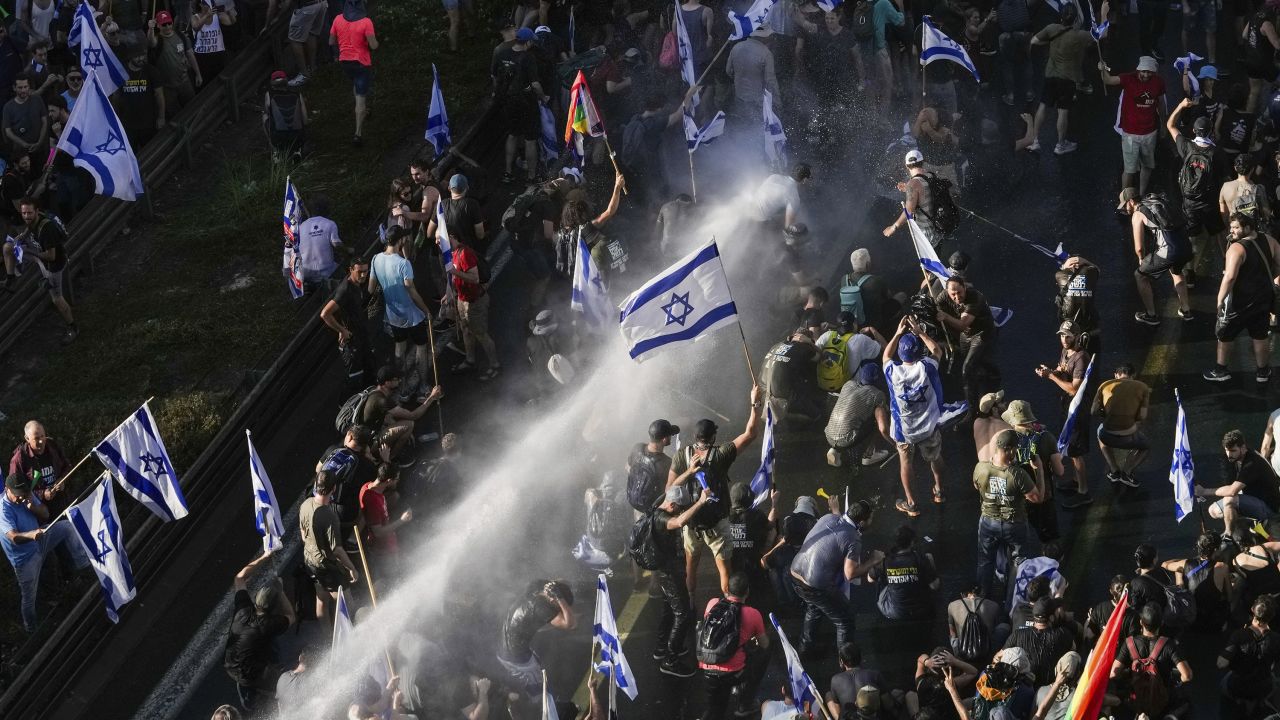
Netanyahu and others have warned of the dangers of not showing up for military duty, but Golov of Brothers and Sisters in Arms says that this is a “divide and conquer” tactic by the prime minister.
The government will try to create a sense of “an opposite world,” said Golov, “when the patriots become traitors.”
Freilich said that Nasrallah, Iran, Gaza and the West Bank, would find “a lot of joy in watching Israel potentially tear itself apart.”
“But the problem is not with the protesters. The problem is with the government and the prime minister that caused this,” he said. “He (Netanyahu) is willing to pay any price to move forward with this.”
Golov sees reservists threatening not to serve as a sign of something much bigger.
“Now it is only the beginning,” Golov said. “But you will see this movement now penetrating into the masses of the ground brigades, also known as the army.”
CNN’s Fred Pleitgen contributed to this report.

